
France is characterised by numerous political trends. This article provides an overview of some of them.
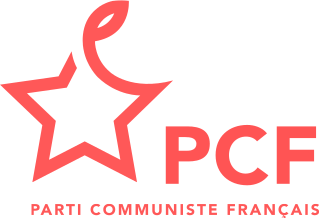
The French Communist Party is a political party in France which advocates the principles of communism. The PCF is a member of the Party of the European Left, and its MEPs sit in the European United Left–Nordic Green Left group.
The French Trotskyist political party Union Communiste is usually known as Lutte Ouvrière, after the name of its weekly paper. Arlette Laguiller has been the party's spokeswoman since 1973 and ran in each presidential election until 2012, when Nathalie Arthaud was the candidate. Robert Barcia (Hardy) was its founder and central leader. Lutte Ouvrière is a member of the Internationalist Communist Union. It emphasises workplace activity and has been critical of such recent phenomena as alter-globalization.
The Revolutionary Communist League was a Trotskyist political party in France. It was the French section of the Fourth International (Post-Reunification). It published the weekly newspaper Rouge and the journal Critique communiste. Established in 1974, it became the leading party of the far-left in the 2000s. It officially abolished itself on 5 February 2009 to merge with smaller factions of the far-left and form a New Anticapitalist Party.
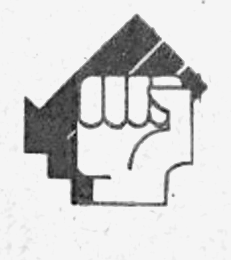
The Workers and Peasants' Socialist Party was an ephemeral socialist organisation in France, formed on June 8, 1938 by Marceau Pivert. Its youth wing was the Workers and Peasants' Socialist Youth.
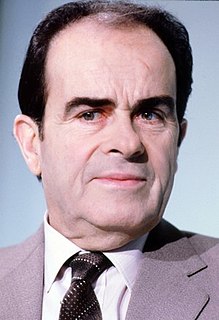
Georges René Louis Marchais was the head of the French Communist Party (PCF) from 1972 to 1994, and a candidate in the French presidential elections of 1981.

Waldeck Rochet was a French communist politician. He was General Secretary of the French Communist Party (PCF) from 1964 to 1972.
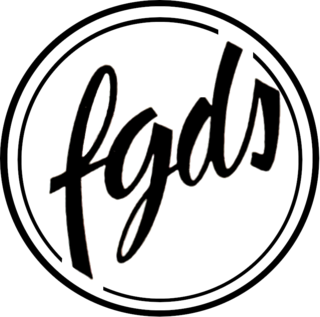
The Federation of the Democratic and Socialist Left was a conglomerate of French left-wing non-Communist forces. It was founded to support François Mitterrand's candidature at the 1965 presidential election and to counterbalance the Communist preponderance over the French left.

The New Left Current was formed in late 1989, mainly by former Communist Youth of Greece (KNE) members.

A referendum on the Maastricht Treaty was held in France on 20 September 1992. It was approved by only 51% of the voters. The result of the referendum, known as the "petit oui", along with the Danish "No" vote are considered to be signals of the end of the "permissive consensus" on European integration which had existed in most of continental Europe until then. From this point forward issues relating to European integration were subject to much greater scrutiny across much of Europe, and overt euroscepticism gained prominence. Only France, Ireland and Denmark held referendums on Maastricht ratification.

The Confédération générale du travail unitaire, or CGTU, was a trade union confederation in France that at first included anarcho-syndicalists and soon became aligned with the French Communist Party. It was founded in 1922 as a confederation of radical unions that had left the socialist-dominated General Confederation of Labour (CGT), and in 1936 merged back into the CGT.

The New Anticapitalist Party is a far-left political party in France founded in February 2009. The party launched with 9,200 members and was intended to unify the fractured movements of the French radical Left, and attract new activists drawing on the combined strength of far-left parties in the 2002 presidential elections, where they achieved 10.44% of the vote, and 7% in 2007 and 13% in 2012.

Olivier Christophe Besancenot is a French left-wing political figure and trade unionist, and the founding main spokesperson of the New Anticapitalist Party from 2009 to 2011.

The Left Front was a French electoral alliance and a political movement created for the 2009 European elections by the French Communist Party and the Left Party when a left-wing minority faction decided to leave the Socialist Party, and the Unitary Left, a group which left the New Anticapitalist Party. The alliance was subsequently extended for the 2010 regional elections and the 2012 presidential election and the subsequent parliamentary election.

Unitary Left was a political party in France that was originally faction within the Revolutionary Communist League. The party is led by Christian Picquet, a former member of the Revolutionary Communist League.

Regional elections were held in France on 14 and 21 March 2010. At stake were the presidencies of each of France's 26 régions, which, though they do not have legislative autonomy, manage sizable budgets.
Anticapitalist Left was a French organisation (2011-2015), member of the Left Front from 2012 to its dissolution in 2015.

The Socialist Party is a centre-left, social-democratic, political party in France. It holds pro-European views. The PS was for decades the largest party of the French left and used to be one of the two major political parties in the French Fifth Republic, along with The Republicans. It replaced the earlier French Section of the Workers' International in 1969 and is currently led by First Secretary Olivier Faure. The PS is a member of the Party of European Socialists, Progressive Alliance and Socialist International.
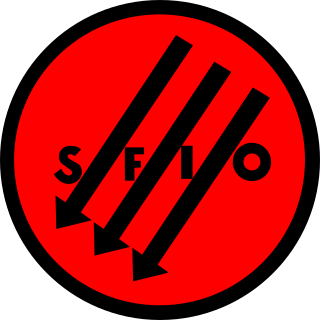
The French Section of the Workers' International was a political party in France that was founded in 1905 and succeeded in 1969 by the modern-day Socialist Party. The SFIO was founded during the 1905 Globe Congress in Paris as a merger between the French Socialist Party and the Socialist Party of France in order to create the French section of the Second International, designated as the party of the workers' movement.
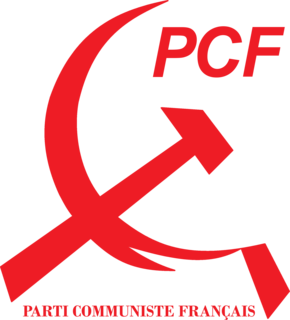
The French Communist Party has been a part of the political scene in France since 1920, peaking in strength around the end of World War II. It originated when a majority of members resigned from the socialist French Section of the Workers' International (SFIO) party to set up the French Section of the Communist International (SFIC). The SFIO had been divided over support for French participation in World War I and over whether to join the Communist International (Comintern). The new SFIC defined itself as revolutionary and democratic centralist. Ludovic-Oscar Frossard was its first secretary-general, and Ho Chi Minh was also among the founders. Frossard himself resigned in 1923, and the 1920s saw a number of splits within the party over relations with other left-wing parties and over adherence to the Communist International's dictates. The party gained representation in the French parliament in successive elections, but also promoted strike action and opposed colonialism. Pierre Sémard, leader from 1924 to 1928, sought party unity and alliances with other parties; but leaders including Maurice Thorez imposed a Stalinist line from the late 1920s, leading to loss of membership through splits and expulsions, and reduced electoral success. With the rise of Fascism this policy shifted after 1934, and the PCF supported the Popular Front, which came to power under Léon Blum in 1936. The party helped to secure French support for the Spanish Republicans during the Spanish Civil War, and opposed the 1938 Munich agreement with Hitler. During this period the PCF adopted a more patriotic image, and favoured an equal but distinct role for women in the communist movement.
















